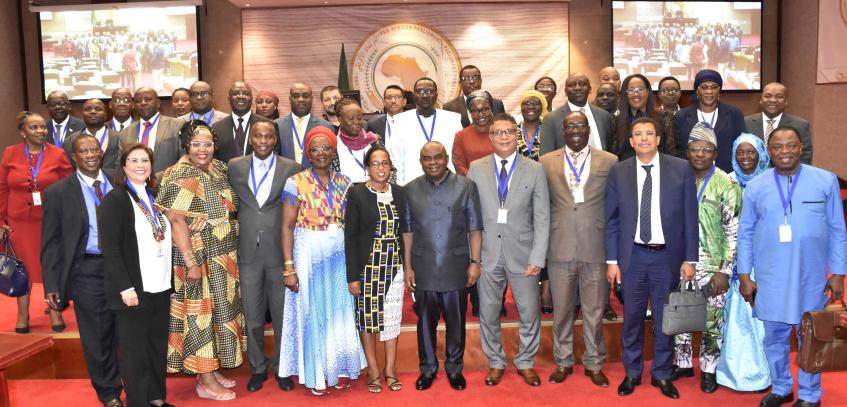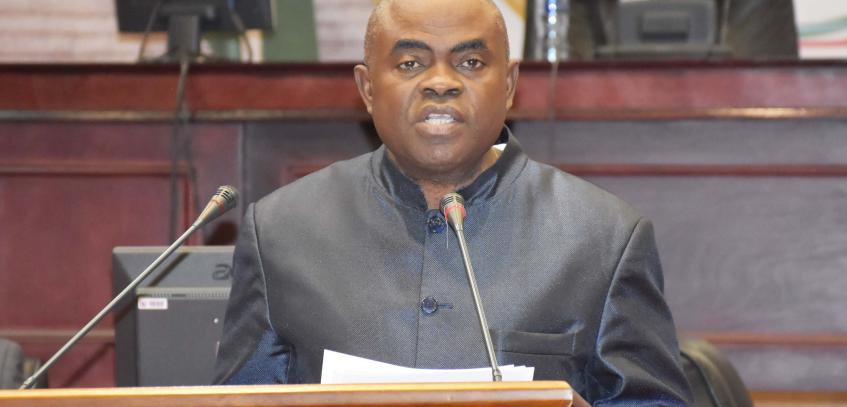The Pan-African Parliament (PAP) Permanent Committees and the African Union Labour Migration Advisory Committee (AU-LMAC) today held a joint Hybrid Seminar on: “Addressing gaps in women and men migrant workers’ protection in Africa through advocacy for the use of legal instruments: the role of Pan-African Parliament and the African Union Labour Migration Advisor Committee”.
The seminar which was guided by the African Union (AU) theme for 2022: “Building resilience in nutrition on the African continent: Accelerate the human capital, social and economic development” took place at the ongoing August Sittings of the Permanent Committees of the sixth Parliament.
The seminar aimed to foster dialogue for PAP to collaborate with AU-LMAC in strengthening the protection and promotion of the rights of migrant workers through collaborative measures and strategies and to continue to promote the mainstreaming of labour migration issues within the overall dialogue on migration at national, regional and continental levels.
“I would like to welcome and encourage this initiative, which will no doubt set the stage for a dynamic cooperation between PAP and the AU-LMAC,” said 4th Vice President Hon. Francois Ango Ndoutoume while opening the seminar.
“The Bureau of the PAP saw it necessary to ensure that six relevant Permanent Committees gather around such an important theme. I also thank the experts of the African Union for their constant availability to share their knowledge and experience in order to strengthen the managerial capacities of parliamentarians in various fields of competence. I encourage and urge you all to persevere because the expectations of our people are immense.”
Hon. Francois Ango Ndoutoume also mentioned that the seminar must have an output that strengthens effective governance, regulation of migration and labour mobility for sustainable development towards inclusive economic growth and regional integration of the African continent.
Hon. Ndoutoume further urged the PAP to play a leading role in the process of ratification and legislative incorporation of relevant legal instruments on labour mobility.
“Ratification and implementation of international and regional legal instruments on labour migration remain a challenge for the continent. The AU Member States are not all at the same level of progress in the ratification and legislative incorporation of the various legal instruments. This joint seminar should also tackle issues of an international, continental and regional legal framework for migration and the approach to refugees, international labour standards, trade in services, free movement and international criminal law relating to the smuggling of migrants and trafficking in human beings,” he said.
Making her presentation, Ms. Odette Bolly, Coordinator of the Joint Labour Migration Programme (JLMP) challenged the PAP to play its key role when it comes to migrant issues.
JLMP is a comprehensive, bold and transformational programme in Africa aimed at strengthening the effective governance and regulation of labour migration and mobility for enhanced sustainable development for inclusive economic growth and regional integration of the African Continent.
“The PAP must participate in creating awareness among the peoples of Africa on the AU’s objectives to strengthen the rights of migrant workers under the JLMP and promote the human and labour rights of migrant workers and members of their families through the various activities of the Programme,” she said.
She further disclosed that the PAP was consulted and gave direction on the development of the Declaration on the Protection and Promotion of the Rights of Migrant Workers and the AU Guidelines on the Development of Bilateral Agreements.
She also underscored that the African Union Commission (AUC) welcomes more collaborations with the PAP as it has contributed to the development of Policy Briefs in various labour migration thematic areas, as well as participation during various meetings of the LMAC.
“We are also available to facilitate advocacy and capacity building meetings and training of the members of PAP as well as the Regional and National Parliaments on Labour Migration.”
Ms. Barbara Banda from the National Association of Businesswomen in Malawi called for legal protection for Migrants in the Informal Sector.
“Workers in the informal economy are often more exposed than those in the formal sector. These differences have been even further pronounced by the COVID-19 pandemic and there is an urgent need to create legal pathways to regularise workers,” she said calling for ending or reducing the activities of organised criminals who exploit migrants’ undocumented status.
“We need to ensure better safety and working conditions including export of benefits for migrant workers. We also need to advocate for guaranteeing a minimum wage, allowing tax revenue and pension contributions, allowing better access to healthcare and providing access to legal recourse to protect migrant rights. We also need to celebrate the International Day of Decent Work by putting the Workers and particularly Migrant Workers at the centre in the spirit of Ubuntu, because of their contributions to both sending and receiving countries,” she added, challenging governments to immediately address labour rights.
Meanwhile, Mr. Sabelo Mbokazi, Head of Labour, Employment and Migration Division of the Department of Health, Humanitarian Affairs, and Social Development (HSS), at the African Union Commission disclosed that the AUC, working with the International Organization for Migration (IOM) and International Labour Organization (ILO), is currently implementing a key programme on the governance of labour migration in Africa, the AU- ILO-IOM-UNECA Joint Programme on Labour Migration Governance for Development and Integration in Africa (JLMP).
He also underscored that the Commission has observed with great concern that the risks faced by, and the protection needs of migrants, including migrant workers and members of their families, with respect to labour exploitation, the full enjoyment of fundamental human rights and rights expressed in international labour standards, are not addressed.
“Migrants are already vulnerable to human rights violations as a result of not being citizens of receiving states and, due to their status, many often live and work in abusive and precarious situations. Through collaborative efforts of the AUC and PAP, we will continue to encourage the Member States to strengthen the protection, promotion and safeguarding of universal human and labour rights for all migrants and upholds the principles of equal treatment and opportunities as well as non-discrimination. We look forward to a continued warm working relationship with the PAP, not only in labour migration issues but also in other issues of common interest,” added Mbokazi.
-Ends-











